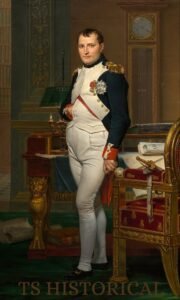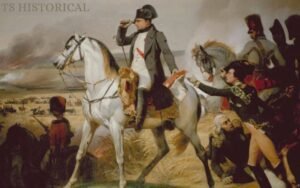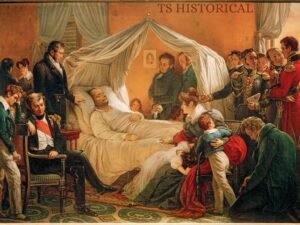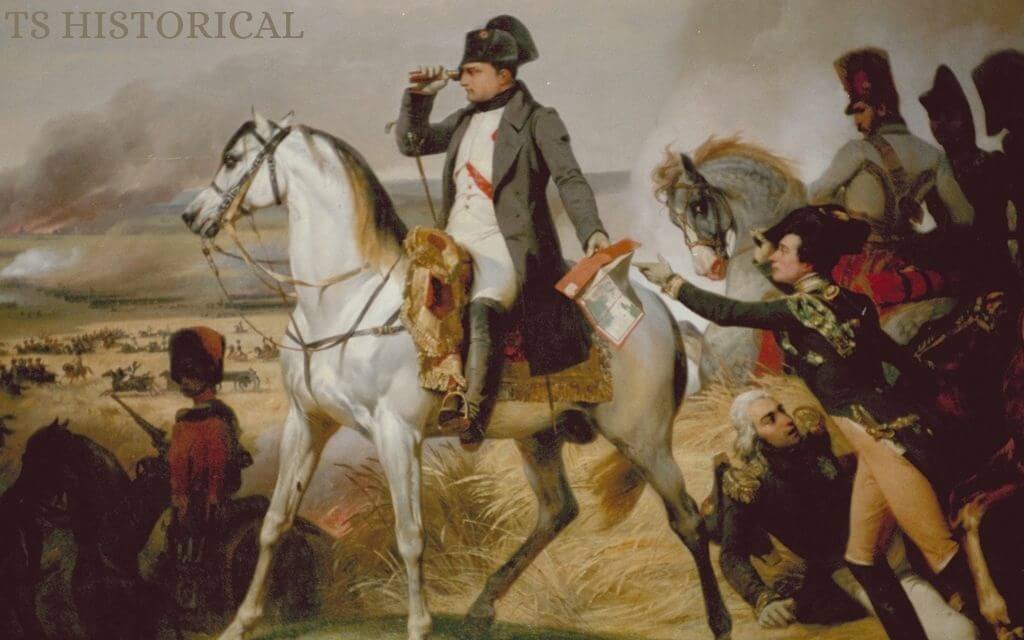
| Reign: | 17 May 1804– 6 April 1814, 20March 1815 – 22 June 1815 |
| Coronation: | 2 December 1804 |
| Predecessor: | First Consul himself |
| Successor: | Louis XVIII of France(King of Italy) |
| Full name: | Napoleon Bonaparte |
| Born: | Napoleon Bonaparte 15 August 1769, Azacio |
| Died: | 5 May 1821 (age 51), Longwood,St. Helena |
| Mausoleum: | Les Invalides |
| Spouses: | Josephine Buhnens and Mary Lewis |
| Children: | Napoleon II |
| Parents: | Carlo Bonaparte, Lie down Ramolino |
| Religion: | Roman Catholicism |
Napoleon Bonaparte was Undoubtedly one of the best military strategists of all time, this man conquered much of Europe before being exiled, only to return to France and start another war before permanently being exiled to a tiny island quite literally in the middle of nowhere, where he died.
Table of Content
Napoleon Bonaparte Early Life
Napoleon was born Napoleone di Bonaparte on August 15, 1769 in Corsica, to Italian parents. His father, Carlo Buonaparte, was Corsica’s representative to the French Royal Court from 1777 until he died in 1785. As a child, Napoleon spoke French with a Corsican accent, and as a result, other children would bully him. He turned to books and was, quote, “distinguished for his application in mathematics. He [was] fairly well acquainted with history and geography.
Napoleon Bonaparte turned 9, he traveled to France to attend a military academy, and when he completed his studies there, he attended the “École Militaire”, training to become an artillery officer. Immediately after graduation, he was commissioned as a lieutenant in the 1st Artillery regiment. During this time, and during the French Revolution, he became a supporter of Robespierre, who was famous for decapitating people and eventually decapitated himself. Also during this time, he was quickly promoted, reaching the rank of Brigadier General in 1793, when he was just 24 years old. It was here that he embarked on his first-ever military campaign.
In 1796, he became the commander of the French Army in Italy, winning a whole lot of battles, and becoming a hero in France. Then, in 1798, Napoleon Bonaparte went to Egypt, to try and protect French trading interests, and to join up with the ruler of Mysore to try and kick the British out of India. This was during the War of the Second Coalition; there would be many, many wars to come in the future.
Napoleon’s expedition failed, but in 1799, the French Revolution ended, and since Napoleon Bonaparte was a famous military leader, he became the new leader of France. He was called the First Consul. A year later, in 1800, Napoleon won his first significant victory as the head of his country. At the battle of Marengo, his French forces fought and defeated Austrian forces, taking 8,000 men captive, while the Austrians only captured 900.
This victory gave Napoleon Bonaparte further power in France — up to this point, his campaign against the Austrians wasn’t going so well, and this battle changed it. Napoleon turned this battle into a propaganda weapon; he named his horse Marengo, as well as several ships. His power escalated quickly, in 1804, he declared himself Emperor of France and basically became King of France. Europe was by then in war (multiple wars, actually).
Napoleonic Wars

One war was fought from 1803-to 1806, another from 1806 to 1807, another in 1809, yet another one from 1812 to 1814, and finally another one in 1815. These wars were the beginning of what would be known as the Napoleonic Wars. The War that went from 1803 to 1806 was called the War of the Third Coalition.
In this war, France, Spain, and a couple of other minor countries fought against the Holy Roman Empire, Britain, Russia, Sweden, and a couple of other countries. It was during this war that the famous Battle of Austerlitz took place — often heralded as Napoleon’s greatest victory, his French Grandée Armée won against Austrian and Russian forces that were 50% larger than his own. As a result of this war, Napoleon’s new “French Empire” was recognized, France gained a whole lot of land, and the Holy Roman Empire, an empire that lasted for almost a thousand years, dissolved.
The next war fought between 1806 and 1807 was the War of the Fourth Coalition. During this war, Napoleon’s French forces (along with his Spanish allies) fought against Prussia (a part of Germany, basically), Russia, and Britain. Napoleon won again, and Prussia lost over half of its land. In 1808, Napoleon Bonaparte invaded Spain and made his brother King of Spain, in what would be known as the Peninsular War.
The war after that (so many wars) was fought in 1809, and was known as the War of the Fifth Coalition. It was fought between France and Britain and a newly-formed Austria. France won, it gained land, and so did a couple of its puppet states. As a result of all these wars, Napoleon controlled much of Europe.
In 1812, however, Napoleon Bonaparte met his first major defeat. He invaded Russia. And he lost in much the same way that Hitler would over a century later. He lost due to the Russian winter. About 75% of Napoleon’s army either perished or were injured in some way. Then, a year later, in 1813, another war broke out. This war was known as the War of the Sixth Coalition. France and its allies were attacked by Russia, Prussia, and the United Kingdom. It was during this war that the famous Battle of Leipzig was fought.
This battle, also known as the Battle of Nations, was fought between Russia, Prussia, and Austria, and was the largest battle in Europe until World War 1.
Napoleon Bonaparte lost this battle, as well as the war, and was forced to abdicate and surrender. France lost a whole lot of land, and Louis XVIII became the king of France. Louis the eighteenth was the brother of Louis the sixteenth, who was guillotined (or decapitated) during the French Revolution). Napoleon was then exiled to Elba, but he couldn’t stay still.
Napoleon Bonaparte Death

In 1815, he snuck out of Elba, returned to France, and declared himself Emperor again. This wouldn’t normally be so easy; however, most of the French Army was still loyal to Napoleon, giving him legitimacy. The other countries (namely Britain, Russia, and Germany) didn’t like the fact that Napoleon returned. They said that Napoleon was an outlaw, and started another war to overthrow him.
This war was known as the Hundred Days War, and also as the War of the Seventh Coalition. This war was Napoleon’s final war; he was finally defeated at Waterloo and was exiled. This time, he was exiled somewhere more remote — Saint Helena, in the middle of the Atlantic Ocean. He would die there six years later, in 1821, at the age of 51, due to what was probably stomach cancer.
Discover more from TS HISTORICAL
Subscribe to get the latest posts sent to your email.

